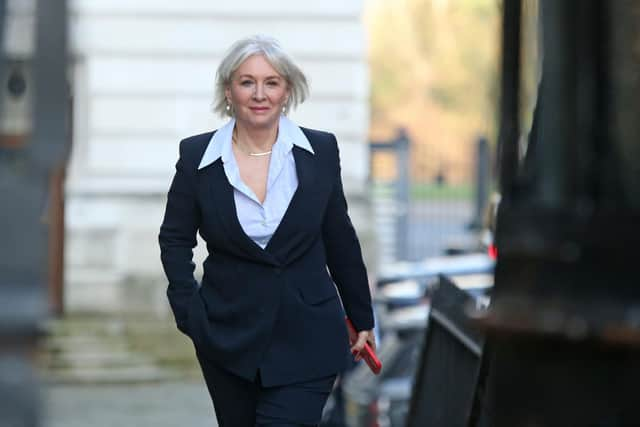Nadine Dorries calls BBC licence fee 'completely outdated' as funding model faces axe
The Culture Secretary made the comments in a podcat by The Spectator magazine and also claimed “the BBC had a problem with impartiality”.
It comes as a Government white paper setting out its plans for the future of the broadcasting sector said there were “clear challenges on the horizon to the sustainability of the licence fee”.
Advertisement
Hide AdAdvertisement
Hide AdThe price of a licence fee is currently £159 but will start rising in line with inflation from April 2024.


The last review of the licence fee in 2015/16 found there were drawbacks to the licence fee but concluded it was the most appropriate funding model for this charter period, which is running until the end of 2027.
The White Paper states: “However, the broadcasting sector continues to change rapidly.
“An increasing number of households are choosing not to hold a TV licence, as fewer people choose to watch live TV or other activities that require a TV licence.
Advertisement
Hide AdAdvertisement
Hide Ad“Should this trend continue as expected there are clear challenges on the horizon to the sustainability of the licence fee. For example, if fewer households are required to hold a TV licence, and there is a desire to maintain the BBC’s current level of funding, then the price of the licence fee would need to increase, potentially significantly, for those households who continue to be required to hold a TV licence.
“The Government also remains concerned that the licence fee is enforced by criminal sanctions, which the Government sees as increasingly disproportionate and unfair in a modern public service broadcasting system. We are particularly concerned that, following the end of the free TV licence concession for over-75s, there is the potential for licence fee enforcement action to be taken against vulnerable elderly people.”
It added: “The Government wants to see the BBC continue to succeed, which is why we need to consider the most fair and appropriate funding mechanism to be introduced at the end of the current Charter period. We want to see the BBC continuing to play its important role producing compelling programmes, contributing to our thriving creative industries, and supporting thousands of jobs across the UK. We also want to see the BBC continuing to provide high quality and impartial news to global audiences through the World Service, which is currently partly funded by the licence
fee, and partly by general taxation.
“The Government will therefore carry out a review of the licence fee funding model ahead of the next Charter period and we intend to set out more detailed plans for that review in the coming months.
Advertisement
Hide AdAdvertisement
Hide Ad“The Government will also continue to support the BBC in diversifying its income streams, becoming more commercially successful and less reliant on the licence fee. The Government recently agreed to increase the BBC’s commercial borrowing limit from £350 million to £750 million, pending the agreement of appropriate oversight mechanisms, to support the BBC in accessing capital and investing in ambitious growth plans.”
The BBC has said it “looks forward to engaging with the Government” on the issue.
Support The Yorkshire Post and become a subscriber today. Your subscription will help us to continue to bring quality news to the people of Yorkshire. In return, you'll see fewer ads on site, get free access to our app and receive exclusive members-only offers. Click here to subscribe.
